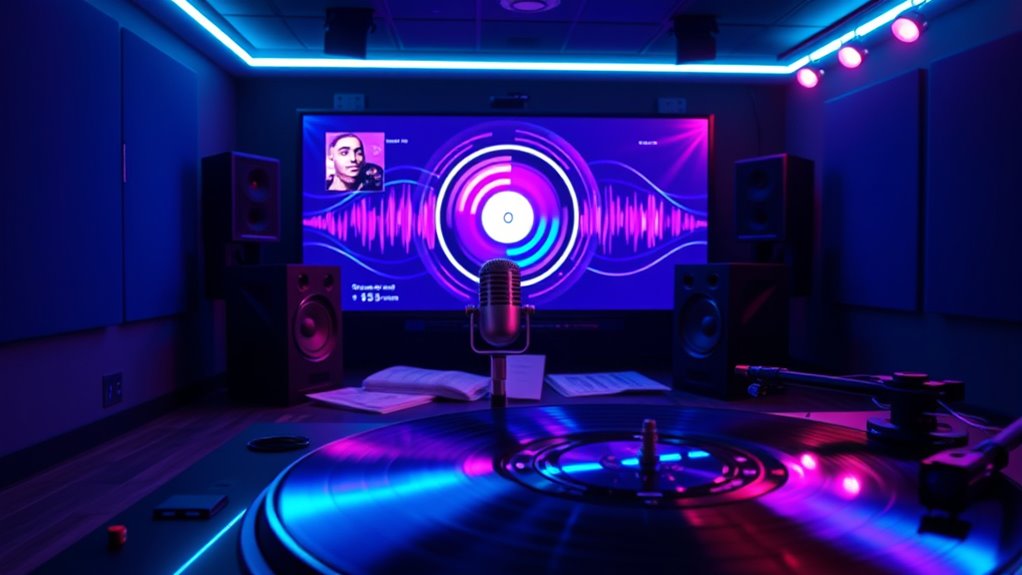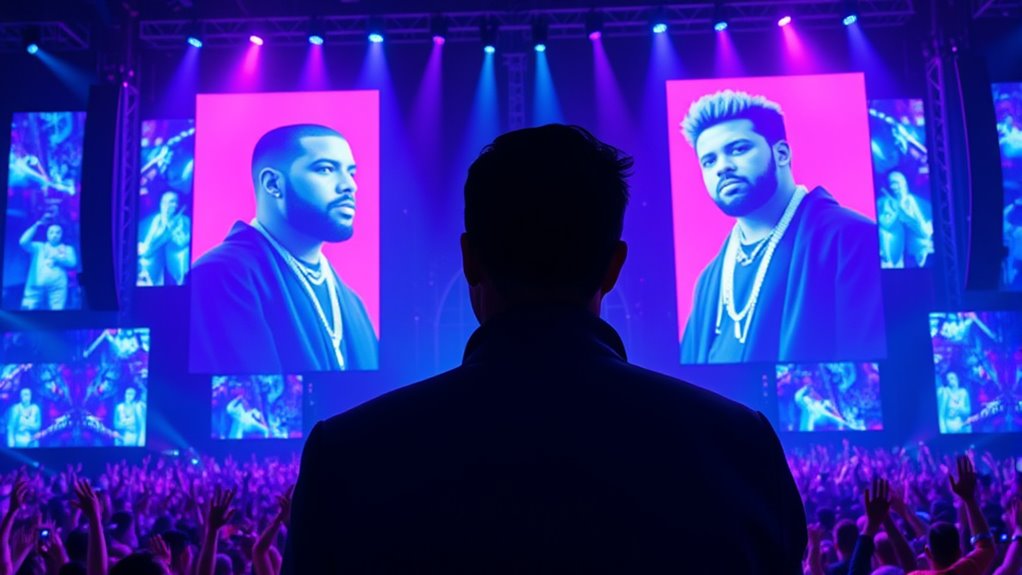A realistic AI-generated song mimicking Drake and The Weeknd has gone viral, sparking controversy. Record labels are striking back, arguing the AI infringes on artists’ rights and damages reputations. While fans enjoy the novelty, artists see it as an invasion of their creative space. Legal and ethical questions cloud the future of AI music. Continue exploring to understand how this emerging technology is shaping the industry and the debates it ignites.
Key Takeaways
- An AI-generated song mimicking Drake and The Weeknd’s voices went viral globally.
- Record labels claim the AI song infringes on artists’ rights and damages brand integrity.
- The technology trains on existing vocal data without artists’ permission, raising copyright concerns.
- Ethical issues include undermining artistic originality and potential misuse for fake content.
- Calls for clearer legal frameworks and regulations to address AI music’s impact on the industry.

A new AI-generated song featuring voices that sound just like Drake and The Weeknd has quickly gone viral, mesmerizing listeners worldwide. It’s impressive how technology can produce such realistic vocals, but it also raises serious questions about copyright issues and ethical implications. When you hear the song, it’s natural to marvel at the technology, but beneath the surface, there’s a murky legal landscape. The song uses AI to mimic the artists’ voices, which means the creators didn’t record new music but instead trained algorithms on existing recordings. This blurs the lines of intellectual property rights, as the original artists haven’t given permission for their vocal likenesses to be used this way. Many argue that such AI creations infringe on copyright, especially since the AI fundamentally copies and reproduces the artists’ unique vocal styles without consent. This situation sparks a debate about who owns the rights—whether it’s the original artists, the AI developers, or the consumers enjoying the music.
On the ethical side, things get even more complicated. You might wonder if it’s right to generate music that sounds like your favorite artists without their involvement or approval. It feels like a violation of artistic integrity, especially when these AI songs can be distributed widely and even generate revenue. Fans might love the novelty, but artists could see it as an invasion of their creative space, undermining their originality and hard work. The ethical implications extend further when considering the potential for misuse—such as creating fake interviews, speeches, or even malicious content that could harm reputations. As a listener, you may find yourself questioning whether you’re supporting genuine artistic expression or unwittingly endorsing an ethically questionable technology. Additionally, the growing use of merchant services in music distribution could influence how such content is monetized and regulated, impacting both artists and consumers.
The record label’s response adds another layer to this controversy. They’ve already started pushing back, claiming that AI-generated music that mimics their artists infringes on their intellectual property rights and damages the artists’ brand. They argue that such unauthorized uses threaten the integrity of the original work and could lead to brand dilution. For you, this means a growing awareness that while AI can produce astonishingly realistic music, it also challenges existing legal frameworks and ethical standards. As AI continues to evolve, you should consider how these issues might shape the future of music creation, ownership, and artistic authenticity. The viral success of this song demonstrates the power of AI, but it also underscores the need for clear laws and ethical guidelines to navigate this new musical frontier.
Frequently Asked Questions
How Does AI Generate Realistic Vocals for Drake and Weeknd?
You can generate realistic vocals for Drake and The Weeknd using voice synthesis, which combines advanced neural networks trained on their existing recordings. These neural networks analyze patterns in pitch, tone, and style, then replicate their voices. By feeding the system new lyrics, it produces convincing singing that mimics their unique vocal characteristics. This process enables AI to create authentic-sounding vocals without needing the artists’ actual performances.
What Legal Actions Are Record Labels Considering Against AI Song Creators?
Record labels are considering legal actions against AI song creators by targeting copyright infringement and protecting artist rights. They might file lawsuits or seek injunctions to stop unauthorized use of their artists’ voices, arguing that AI-generated songs breach intellectual property laws. By doing so, they aim to defend their artists’ rights and prevent further unauthorized reproductions, ensuring that creators and labels maintain control over how their music is used and distributed.
Can Ai-Created Songs Influence Future Artist Collaborations?
Could AI-created songs reshape artist collaborations? Absolutely. They challenge AI ethics and artistic originality, pushing artists to innovate beyond machine-generated melodies. Future collaborations might blend human creativity with AI tools, fostering unique sounds. Do you think AI can inspire genuine partnerships, or will it blur the line between human artistry and technology? Embracing AI’s potential could redefine how artists work together, creating new genres and expanding musical horizons.
How Do Fans Differentiate Between Real and Ai-Generated Music?
You can tell apart real from AI-generated music by paying attention to fan skepticism and authenticity challenges. Fans often notice subtle vocal inconsistencies or unusual production qualities that don’t match the artist’s typical style. They rely on their familiarity with the artist’s voice and musical nuances. Staying informed about new releases and official channels helps you verify authenticity, making it easier to distinguish genuine tracks from AI creations.
What Ethical Concerns Arise From AI Mimicking Famous Artists?
You should consider that AI mimicking famous artists raises ethical concerns around privacy and artistic authenticity. Fans and artists worry about privacy breaches, as AI can misuse voice data without consent. Additionally, AI-generated music challenges the authenticity of art, making it harder to distinguish original creativity from machine-produced content. This could undermine artists’ rights and the value of genuine talent, prompting debates on regulation and ethical boundaries in music creation.
Conclusion
You see, this viral AI-generated song shows how easily technology can blur the lines between reality and fiction. While it’s impressive, it also raises questions about authenticity in music. Think of it like a visual map—each idea connected by lines that could be real or fabricated. As you explore, you realize the importance of verifying sources and understanding the power of AI, reminding you to stay critical in this digital age.










